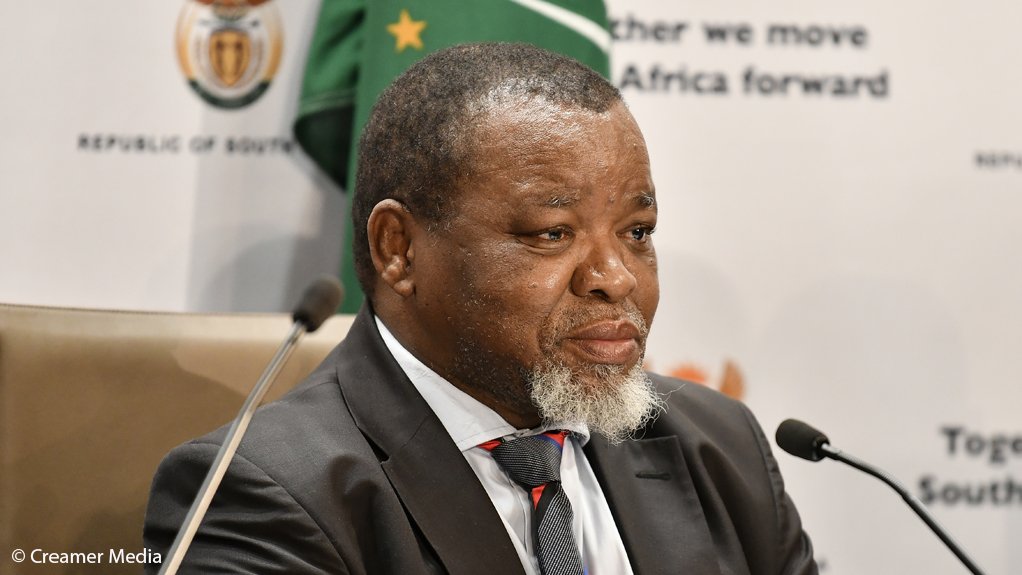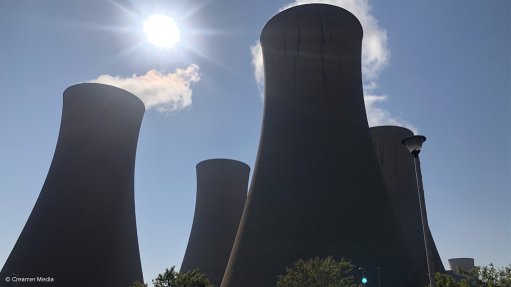Mantashe agrees to creation of engagement forum with renewables stakeholders


Mineral Resources and Energy Minister Gwede Mantashe
Photo by Creamer Media's Donna Slater
Mineral Resources and Energy Minister Gwede Mantashe met with renewable-energy stakeholders on Thursday in an effort to build trust, improve communication and reduce obstacles to the roll-out of renewable energy in South Africa.
The virtual meeting proceeded despite the fact that the Minister had been self-isolating since he and his wife, Nolwandle Mantashe, tested positive for Covid-19 on July 14.
Mantashe urged stakeholders to move beyond “polemics and anarchy” and to offer solutions to the current constraints facing the electricity supply industry.
He again stressed that government’s approach to the energy transition would be to embrace both an energy mix that was open to various generation technologies, as well as to one that was framed by the need for a “just transition”.
“A just transition cannot mean jumping like a pendulum from one extreme to another,” he said, arguing that the shift from coal to renewables needed to be systematic and supportive of vulnerable workers and communities in coal regions.
The event, which was facilitated by energy expert Chris Yelland, was address by various stakeholders, including several renewable-energy associations and professional bodies, as well as Eskom, the Congress of South African Trade Unions (Cosatu), Business Unity South Africa and the Black Business Council.
Large consumer groupings, such as the Association of Municipal Electricity Distributors of South Africa (AMEU) and the Energy Intensive Users Group (EIUG), also provided input.
Cosatu’s Matthew Parks indicated that the federation supported the move to renewable energy, but was concerned that the mooted transition was currently being erroneously coupled with the disputes over the high tariffs being paid to independent power producers (IPPs) that secured power purchase agreements at the start of South Africa’s deployment of utility-scale renewables in 2011.
It was important, he said, to uncouple the renewables opportunity from this IPP issue and said that Cosatu felt that this could be achieved through Eskom and communities being allowed and empowered to invest in renewables.
Cosatu was also concerned about the absence of a clear plan to ensure that the transition away from coal to renewables would be just for currently employed workers.
Busa CEO Cas Coovadia said business was also worried that the Integrated Resource Plan 2019 (IRP 2019) was not being implemented fast enough, despite the fact that inadequate electricity supply had emerged as a key risk to growth, investor confidence and job creation.
Busa was, thus, keen to see progress in addressing outstanding policy matters and regulatory constraints on both large-scale renewables, as well as the self-generation projects being planned and implemented by many companies, municipalities and households.
EIUG deputy chairperson Jevon Martin added that those industrial and mining companies that were planning to invest in self-generation projects were finding the lack of clear regulatory and wheeling frameworks to be major constraints. Nevertheless, these companies were persisting partly to secure greater visibility of their tariff trajectories in a context where Eskom tariffs continued to rise sharply.
AMEU’s Valley Padayachee was equally concerned about the current tariff trajectory and structure, arguing that reforms were required not only to ensure the accelerated integration of renewables, but also to improve the sustainability of municipal distributors.
Padayachee said it was imperative that government created a level playing field for municipalities to “aggressively” add renewables to their energy portfolios.
All of the energy associations that participated in the event, including the South African Wind Energy Association (SAWEA), the South African Photovoltaic Industry Association, the South African Renewable Energy Association, the South African Independent Power Producers Association and the South Africa Energy Storage Association, welcomed the formation of a formal engagement forum at which new ideas could be canvassed and obstacles addressed.
SAWEA CEO Ntombifuthi Ntuli proposed that the forum meet quarterly and that its initial agenda be set to resolve obstacles to the implementation of the IRP 2019, as well as to engage on tariff issues.
Ntuli said the agenda should also seek to ensure that the deployment of renewable energy was pursued in a way that not only addressed the country’s prevailing power crisis, but also facilitated industrialisation, transformation and job creation.
Mantashe said the virtual event had exceeded his expectations and that he hoped that it would set the tone for ongoing and regular engagements on addressing the country’s energy challenge.
“If we don’t get energy right, we are not going to recover quickly from Covid-19 and we are not going to recover enough from the recent downgrades,” he warned.
Event participants voted overwhelmingly in favour of establishing a 25-member committee of stakeholders to have ongoing engagements with Mantashe on renewable-energy matters.
Article Enquiry
Email Article
Save Article
Feedback
To advertise email advertising@creamermedia.co.za or click here
Press Office
Announcements
What's On
Subscribe to improve your user experience...
Option 1 (equivalent of R125 a month):
Receive a weekly copy of Creamer Media's Engineering News & Mining Weekly magazine
(print copy for those in South Africa and e-magazine for those outside of South Africa)
Receive daily email newsletters
Access to full search results
Access archive of magazine back copies
Access to Projects in Progress
Access to ONE Research Report of your choice in PDF format
Option 2 (equivalent of R375 a month):
All benefits from Option 1
PLUS
Access to Creamer Media's Research Channel Africa for ALL Research Reports, in PDF format, on various industrial and mining sectors
including Electricity; Water; Energy Transition; Hydrogen; Roads, Rail and Ports; Coal; Gold; Platinum; Battery Metals; etc.
Already a subscriber?
Forgotten your password?
Receive weekly copy of Creamer Media's Engineering News & Mining Weekly magazine (print copy for those in South Africa and e-magazine for those outside of South Africa)
➕
Recieve daily email newsletters
➕
Access to full search results
➕
Access archive of magazine back copies
➕
Access to Projects in Progress
➕
Access to ONE Research Report of your choice in PDF format
RESEARCH CHANNEL AFRICA
R4500 (equivalent of R375 a month)
SUBSCRIBEAll benefits from Option 1
➕
Access to Creamer Media's Research Channel Africa for ALL Research Reports on various industrial and mining sectors, in PDF format, including on:
Electricity
➕
Water
➕
Energy Transition
➕
Hydrogen
➕
Roads, Rail and Ports
➕
Coal
➕
Gold
➕
Platinum
➕
Battery Metals
➕
etc.
Receive all benefits from Option 1 or Option 2 delivered to numerous people at your company
➕
Multiple User names and Passwords for simultaneous log-ins
➕
Intranet integration access to all in your organisation



















